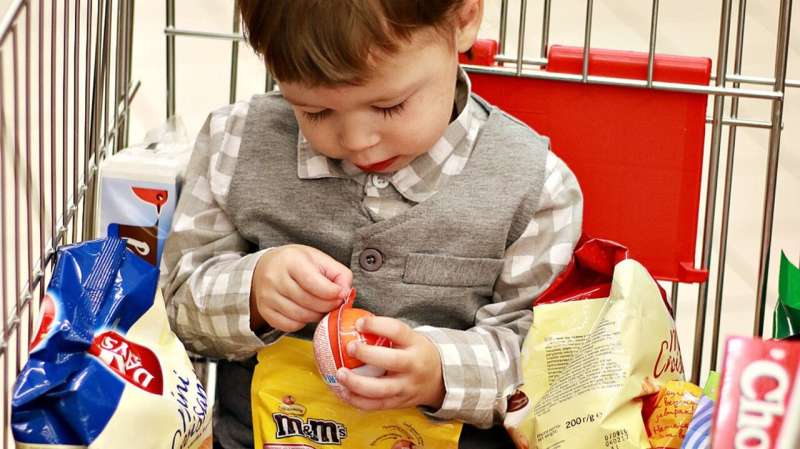This article has been reviewed according to Science X's editorial process and policies. Editors have highlighted the following attributes while ensuring the content's credibility:
fact-checked
peer-reviewed publication
proofread
Aussie babies and toddlers are targeted with unhealthy foods, finds research

Babies and toddlers can't read or buy food yet, but new research reveals that they are being targeted with aggressive marketing in the baby and toddler aisle at the supermarket.
The research, published Nov. 28 in the Australian and New Zealand Journal of Public Health, has prompted health experts to call for regulation of on-pack labeling and promotional techniques used on baby and toddler food.
Authors analyzed 230 product packs found in two major supermarkets to uncover the marketing techniques used by manufacturers of products for children aged from just 6 months to 3 years. They found that 9 in 10 food packages displayed techniques specifically designed to target young children.
Of all the products reviewed 55% included child-appealing visuals such as bright colors and graphics. More than a third of all packages included images of a baby or child on the front of the package, and 1 in 6 included recognizable branded characters.
Lead author and VicHealth Postdoctoral Researcher, Dr. Alexandra Chung from Monash University, says the food industry deliberately uses child-targeted marketing techniques alongside deceptive messaging aimed at parents.
"Food marketers are deliberately using child-appealing images to attract the attention of very young children and make their product seem fun and desirable. Unfortunately, many of these products are highly processed and are not recommended by health and nutrition experts.
"Our research also found that parents are being bombarded with on-pack messaging. 96% of products used an image of a healthy food on the front of the pack—even though this might only make-up a small proportion of the product. 58% of products made claims about nutritional content, while 52% of product packs said the product was organic and 51% used claims relating to the product being natural.
"Toddlers and babies are being marketed to by the baby food industry, and when the children reach for these products parents feel reassured from bogus health claims that it's a good choice to go in their shopping trolley. The reality is that most of these commercially produced products contain too much sugar and are not nutritionally adequate."
Dr. Chung says the study also raises concerns about the sheer amount of snack and sugary foods targeted at toddlers in supermarkets.
"50% of the toddler foods found in these major supermarkets were snack foods and 20% would be classified as confectionary based on the sugar content. These included things like fruit bars and yogurt buttons.
"85% of all baby and toddler products highlighted their convenient packaging—like squeezable pouches, single servings or individually wrapped. There is a lot of marketing messaging around convenient products that can be offered on-the-go, and this distracts from the importance of designated mealtimes consumed at the dinner table with the family," Dr. Chung says.
Professor Kathryn Backholer, a Vice President for the Public Health Association of Australia and a co-author on the study, says that the research points to the need for tighter regulation to protect our youngest children's diets from industry influence.
"This research shows we can't rely on big food companies spruiking products to babies and toddlers to do the right thing. While there are some labeling regulations for baby and toddler foods in Australia, currently these do not go far enough to protect children's diets. Regulation is needed to ensure that these foods are nutritionally adequate and do not mislead consumers with deceptive labeling or marketing."
"It's not fair to leave it up to parents to navigate sneaky marketing and check ingredient lists and nutrition panels for accurate information or to have to battle pester power. To shield our youngest children's diets from commercial interests and promote good eating habits, Government needs to step in and stop relying on industry self-regulation."
More information: Alexandra Chung et al, Front-of-pack marketing on infant and toddler foods: Targeting children and their caregivers, Australian and New Zealand Journal of Public Health (2023). DOI: 10.1016/j.anzjph.2023.100101




















